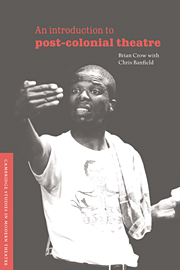Book contents
- Frontmatter
- Contents
- Preface
- Acknowledgements
- Introduction
- 1 Derek Walcott and a Caribbean theatre of revelation
- 2 August Wilson's theatre of the blues
- 3 Jack Davis and the drama of Aboriginal history
- 4 Wole Soyinka and the Nigerian theatre of ritual vision
- 5 Athol Fugard and the South African ‘workshop’ play
- 6 Badal Sircar's Third Theatre of Calcutta
- 7 Girish Karnad and an Indian theatre of roots
- Conclusion
- Further reading list
- Index
2 - August Wilson's theatre of the blues
Published online by Cambridge University Press: 26 February 2010
- Frontmatter
- Contents
- Preface
- Acknowledgements
- Introduction
- 1 Derek Walcott and a Caribbean theatre of revelation
- 2 August Wilson's theatre of the blues
- 3 Jack Davis and the drama of Aboriginal history
- 4 Wole Soyinka and the Nigerian theatre of ritual vision
- 5 Athol Fugard and the South African ‘workshop’ play
- 6 Badal Sircar's Third Theatre of Calcutta
- 7 Girish Karnad and an Indian theatre of roots
- Conclusion
- Further reading list
- Index
Summary
Visitors to Washington, DC may well be struck by the fact that only a mile or so away from the White House and the Capitol Building, the political centres of power in the world's richest and most powerful state, there are the ghetto slums of a predominantly black city, whose communities often live in conditions more akin to the Third World than the First. The same is true of other American cities, the largely black populations of Harlem or Watts for example, inhabiting in crucial respects a different world, a different reality from those mainly white, middle-class people who live sometimes only a few blocks away in New York and Los Angeles. Periodically, as we know, the frustrations, resentments and anger accompanying these extraordinary material discrepancies within the same society have exploded into large-scale race riots and rebellions. But even when American cities with large black populations are ‘peaceful’, the simmering discontents hardly breaking the surface of routine life, there are still constant reminders of black deprivation not only in the obvious material appearances of poverty, but in the soaring crime rates, the violence on the streets, the prevalence of such ills as drug and alcohol abuse and prostitution, and the statistics relating to employment, education and health.
While much has been done to come to grips with some of these problems – not least by black communities themselves, through a range of neighbourhood-based organizations – and though there have been localized successes, it cannot be said that the picture as a whole is encouraging or progressively improving. Indeed, many knowledgeable commentators would say that, if anything, the reverse is the case.
- Type
- Chapter
- Information
- An Introduction to Post-Colonial Theatre , pp. 41 - 60Publisher: Cambridge University PressPrint publication year: 1996

